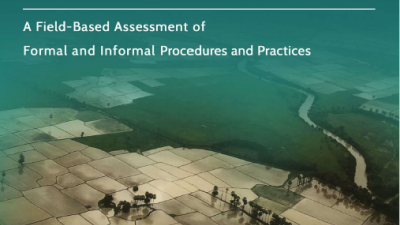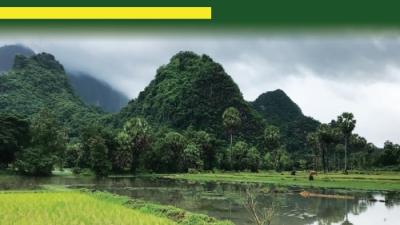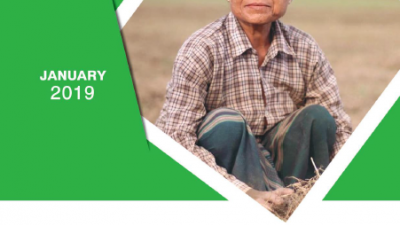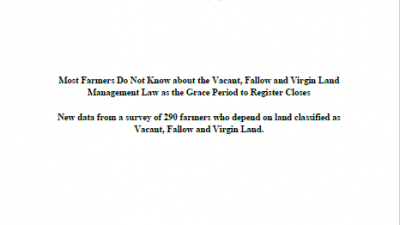-
Imagine: you live in a wooden house with basic utilities and you depend on your nearby farmland for the livelihood of your family. Private companies, government officials and ethnic armed...
Housing, Land and Properties Right Assessment
Imagine: you live in a wooden house with basic utilities and you depend on your nearby farmland for the livelihood of your family. Private companies, government officials and ethnic armed organisations are interested in your land, but you have no way to defend yourself.
In Myanmar, decades of civil war and abuses by the military and other actors have created an atmosphere of fear and mistrust in institutions. The recent bilateral ceasefire agreements between the ethnic armed organisations and the military have given you some hope, but there is still no peace agreement in place which sets a clear line between the violent past and a more promising future. Your own future livelihood may depend on the help of civil society organisations and the legal assistance they may provide. This is the reality of many people belonging to ethnic minorities such as the Mon and Karen people in South East Myanmar.
The Norwegian Refugee Council (NRC) works to assist the conflict-affected communities in Myanmar protecting their land. We've conducted a micro level analysis of the situation in Mon State, at the heart of the South East. To address land disputes, the report recommends strengthening information, counselling and legal assistance services and building capacities and institutions.
-
Alternative Dispute Resolution/ Collaborative Dispute Resolution to resolve land disputes
Land disputes are often a political and social minefield. When it comes to land rights, even the smallest disagreement can raise tensions for farmers, families, communities, governments and ethnic armed organisations. Such disagreements can escalate into conflicts and fuel civil wars. It is therefore vital to find practical ways of addressing issues at the earliest possible stage.
There are, however, many ways to solve a dispute, some more effective than others. For example, an authority can make a top-down decision based exclusively on available documents (which may not be correct or fair) without any consultation. It may simply impose a solution regardless of the wishes and legal rights of the people involved. Unfortunately, this approach is all too common. Moreover, laws do not always take into account alternative ways of solving conflicts.
In Myanmar, the Norwegian Refugee Council (NRC) has worked with village leaders, local authorities and ethnic armed organisations to adopt a “middle way”, in order to address some of the most common land disputes. We have used a process of mediation, analysing the conflicts, interviewing the parties, and proposing options that fit people’s interests rather than their positions. This has resulted in agreements that have the potential to last over time and make everyone’s lives easier.
Our report, A Feasibility Assessment on the Introduction of Alternative Dispute Resolution/Collaborative Dispute Resolution to Resolve Land Disputes in Myanmar, has been written in collaboration with Chris Moore from CDR Associates. It contains a detailed analysis of land dispute resolution in Myanmar and suggests ways to improve access to justice by using this much needed “middle way”.
Land disputes are often a political and social minefield. When it comes to land rights, even the smallest disagreement can raise tensions for farmers, families, communities, governments and ethnic armed organisations. Such disagreements can escalate into conflicts and fuel civil wars. It is therefore vital to find practical ways of addressing issues at the earliest possible stage.
There are, however, many ways to solve a dispute, some more effective than others. For example, an authority can make a top-down decision based exclusively on available documents (which may not be correct or fair) without any consultation. It may simply impose a solution regardless of the wishes and legal rights of the people involved. Unfortunately, this approach is all too common. Moreover, laws do not always take into account alternative ways of solving conflicts.
In Myanmar, the Norwegian Refugee Council (NRC) has worked with village leaders, local authorities and ethnic armed organisations to adopt a “middle way”, in order to address some of the most common land disputes. We have used a process of mediation, analysing the conflicts, interviewing the parties, and proposing options that fit people’s interests rather than their positions. This has resulted in agreements that have the potential to last over time and make everyone’s lives easier.
Our report, A Feasibility Assessment on the Introduction of Alternative Dispute Resolution/Collaborative Dispute Resolution to Resolve Land Disputes in Myanmar, has been written in collaboration with Chris Moore from CDR Associates. It contains a detailed analysis of land dispute resolution in Myanmar and suggests ways to improve access to justice by using this much needed “middle way”.
-
In Myanmar, we're learning more about how village leaders solve land disputes in the traditional way to help inform policy makers on the best ways forward to ensure protection of displaced people....
Customary Land Dispute Resolution Report
In Myanmar, we're learning more about how village leaders solve land disputes in the traditional way to help inform policy makers on the best ways forward to ensure protection of displaced people.
They say that good boundaries make good neighbours, however it is often difficult to determine where such boundaries lie. In rural Myanmar, disputes over boundaries are often solved through traditional methods, which include engaging the village elders and other customary authorities.
Decades of civil war and massive development have created even more serious problems concerning land, such as people being forced to flee and returning to see their land occupied by others. Sometimes the military, ethnic armed organisations, the government, companies or a combination of them take over the land of farmers without following a legal procedure or providing adequate compensation for the land lost. This creates very serious problems for displaced people.
The Norwegian Refugee Council (NRC), together with Displacement Solutions, has conducted a study to learn more about how village leaders solve land disputes in the traditional way to help inform policy makers on the best ways forward to ensure protection. The report is entitled "A HLP-Rights Based Assessment of Customary Land Dispute Resolution in Eastern Bago Region and Kayin and Shan States."
-
Several MyJustice partners undertook case documentations of women’s experience of navigating justice systems in Myanmar, for a range of different issues. Myanmar versions of these documentations are...
Women’s Experience of the Law in Myanmar: A documentation of select cases (1)
Several MyJustice partners undertook case documentations of women’s experience of navigating justice systems in Myanmar, for a range of different issues. Myanmar versions of these documentations are downloadable from the links below. An English synthesis is forthcoming.
-
Several MyJustice partners undertook case documentations of women’s experience of navigating justice systems in Myanmar, for a range of different issues. Myanmar versions of these documentations are...
Women’s Experience of the Law in Myanmar: A documentation of select cases (2)
Several MyJustice partners undertook case documentations of women’s experience of navigating justice systems in Myanmar, for a range of different issues. Myanmar versions of these documentations are downloadable from the links below. An English synthesis is forthcoming.
-
Several MyJustice partners undertook case documentations of women’s experience of navigating justice systems in Myanmar, for a range of different issues. Myanmar versions of these documentations are...
Women’s Experience of the Law in Myanmar: A documentation of select cases (3)
Several MyJustice partners undertook case documentations of women’s experience of navigating justice systems in Myanmar, for a range of different issues. Myanmar versions of these documentations are downloadable from the links below. An English synthesis is forthcoming.
-
Several MyJustice partners undertook case documentations of women’s experience of navigating justice systems in Myanmar, for a range of different issues. Myanmar versions of these documentations are...
Women’s Experience of the Law in Myanmar: A documentation of select cases (4)
Several MyJustice partners undertook case documentations of women’s experience of navigating justice systems in Myanmar, for a range of different issues. Myanmar versions of these documentations are downloadable from the links below. An English synthesis is forthcoming.
-
Several MyJustice partners undertook case documentations of women’s experience of navigating justice systems in Myanmar, for a range of different issues. Myanmar versions of these documentations are...
Women’s Experience of the Law in Myanmar: A documentation of select cases (5)
Several MyJustice partners undertook case documentations of women’s experience of navigating justice systems in Myanmar, for a range of different issues. Myanmar versions of these documentations are downloadable from the links below. An English synthesis is forthcoming.
-
Namati offers this brief in the hope that Myanmar’s national reforms and the implementation of the country’s new National Land Use Policy can grow from the lived experience of ordinary Myanmar...
Gendered Aspects of Land Rights in Myanmar II: Evidence from Paralegal Case Work
Namati offers this brief in the hope that Myanmar’s national reforms and the implementation of the country’s new National Land Use Policy can grow from the lived experience of ordinary Myanmar citizens. Namati and our partners assist farmers in Myanmar to claim their land rights through a community paralegal approach. Community paralegals are trained in relevant laws, community education, negotiation, and mediation skills to work with farmers to resolve a variety of land rights issues. Dozens of data points are documented as part of each case resolution process that illustrates how the legal framework functions in practice. It is this casework data that underpin this policy brief. Focus groups and interviews with paralegals and clients further provide qualitative context and insights.
Namati recommends actions the Myanmar government can take as part of implementing its new National Land Use Policy to help increase women’s engagement in land use management and access to tenure rights. This briefing also provides recommendations for civil society organizations interested in the community paralegal model, and, in particular, in increasing the number of women paralegals in the country as a means of women’s empowerment.
-
On September 11, 2018 parliament passed an amendment to the Vacant, Fallow and Virgin (VFV) Land Management Law. This law has been criticized by many groups ranging from civil society groups to...
Vacant, Fallow and Virgin Land Management Law
On September 11, 2018 parliament passed an amendment to the Vacant, Fallow and Virgin (VFV) Land Management Law. This law has been criticized by many groups ranging from civil society groups to mining companies. The primary concern is that it will cause further insecurity for farmers and ethnic communities. For purposes of this report when we refer to the VFV Management land law we refer to both the original 2012 VFV and the 2018 amendment to it – which has introduced new problems for farmers.
Most of the lands classified as VFV are in ethnic rural areas and up to 10 million people live or rely on this land for their livelihood. The new law means that these people must now apply for 30-year concessions to use their own land. If they fail to do so and another group such as a company is awarded their land, they face up to two years in prison for trespass. While the amendment does exclude land being used under customary tenure from being classified as VFV, the law provides no definition of customary land or any procedure by which communities can register their land as customary.
This report presents new data from a survey of 290 farmers who depend on land classified as Vacant, Fallow and Virgin Land.



